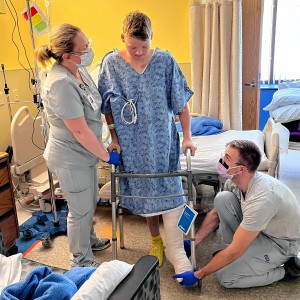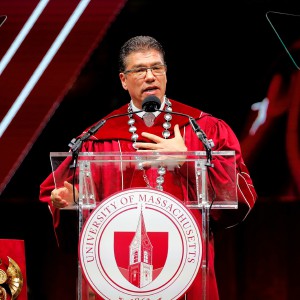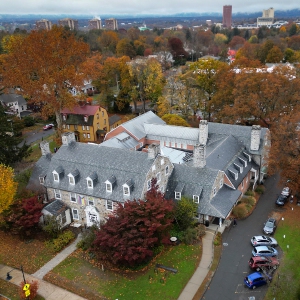Debt-exclusion override vote for new Amherst elementary school set for May 2
| Published: 03-02-2023 9:18 PM |
AMHERST — Town residents can now circle May 2 their calendars. That’s the long-awaited day when voters will decide the fate of a $98 million elementary school project in a Proposition 2½ debt-exclusion vote.
Town Council on Monday voted unanimously to have the project come to a vote on the first Tuesday in May. That was a date that has long been suggested by officials as appropriate for the vote, coming a week after students and teachers return from the public schools’ April vacation, when many families may be traveling, and before the University of Massachusetts spring semester ends.
Voters will also have a mail-in option, as well as four days of early in-person voting at Town Hall. That will take place April 24-27, from 8 a.m. to 4:30 p.m. each day.
Town Clerk Susan Audette told councilors that the Board of Registrars recommended the days and hours of early voting to be in compliance with state law. There are no plans for early in-person voting evening hours or early in-person voting at any other sites besides Town Hall.
People who don’t vote early will go to their customary polling places on May 2, just as they will in November for the biennial town election.
The project being considered is a 105,570-square-foot, three-story building designed by DiNisco Design Inc. of Boston that, if approved, would be constructed on the site of Fort River School on South East Street.
Planned for a fall 2026 opening, the school would replace both Fort River and Wildwood schools, 1970s-era buildings, and serve K-5 students, with sixth graders at those schools and the town’s third elementary school, Crocker Farm, joining their peers at the Amherst Regional Middle School.
The Fort River site was selected by the building committee because of its size, which can accommodate construction while not disrupting classes. The site also can have additional playing fields.
Article continues after...
Yesterday's Most Read Articles
 Political newcomer defeats Shores Ness for Deerfield Selectboard seat
Political newcomer defeats Shores Ness for Deerfield Selectboard seat
 Granby Bow and Gun Club says stray bullets that hit homes in Belchertown did not come from its range
Granby Bow and Gun Club says stray bullets that hit homes in Belchertown did not come from its range
 Annette Pfannebecker: Vote yes for Shores Ness and for Deerfield
Annette Pfannebecker: Vote yes for Shores Ness and for Deerfield
 Susan Tracy: Support Ukraine funding
Susan Tracy: Support Ukraine funding
 Around Amherst: Bockelman joins in launch of governor’s housing push
Around Amherst: Bockelman joins in launch of governor’s housing push
 Defying the odds: Hadley’s Owen Earle back competing less than two years removed from horrific accident
Defying the odds: Hadley’s Owen Earle back competing less than two years removed from horrific accident
Audette said her office has already received 400 applications for ballots from people interested in voting by mail. Those ballots will be ready “definitely by the beginning of April, hopefully sooner,” Audette said.
Many of the processes to hold the election can begin now that the date is set and can be entered into the state’s voter registration system, she said.
While the language of the debt-exclusion vote is mandated by the state and can’t be adjusted, how to get information to voters, and what is allowed to be explained, are being discussed by councilors.
A group in support of the project has formed and councilors can advocate for the project as well, though they have to use care not to spend any town money on materials.
Unlike state elections, in which the secretary of state produces a red book that provides background and detailed answers and is mailed to all voters, the town is not allowed to produce anything similar, Town Manager Paul Bockelman said.
“The town can’t expend any funds to influence the vote in any way, shape or form,” Bockelman said.
He will consult with KP Law, the town attorney, as to what can be legally done. Bockelman said the town doesn’t want to put the vote at any risk of legal challenges.
The exact cost to taxpayers will also be in flux in the lead-up to the vote, as the town waits to see how much the state will reimburse it for the project, likely in the 30% to 40% range. There are also proposals from councilors that could direct capital free cash toward the project to offset long-term borrowing costs.
The town has said that the school building project would mean a $478.24 increase in annual property taxes for an average single-family home this year assessed at $446,953. That increase is based the town being responsible for $54 million of the total project.
District 1 Councilor Cathy Schoen is proposing $5 million of capital reserves to support the initial costs of geothermal and photovoltaic systems in the new building, while At Large Councilor Ellisha Walker is suggesting using $10 million of capital reserves.
Councilors Monday also approved use of $700,000 in Community Preservation Act money “for the rehabilitation of and improvements to” the playing fields at Fort River.

 Sharing a few notes: High schoolers coaching younger string players one on one
Sharing a few notes: High schoolers coaching younger string players one on one Reyes takes helm of UMass flagship amid pro-Palestinian protests
Reyes takes helm of UMass flagship amid pro-Palestinian protests Sole over-budget bid could doom Jones Library expansion project
Sole over-budget bid could doom Jones Library expansion project Amherst poised to hire police department veteran as new chief
Amherst poised to hire police department veteran as new chief 